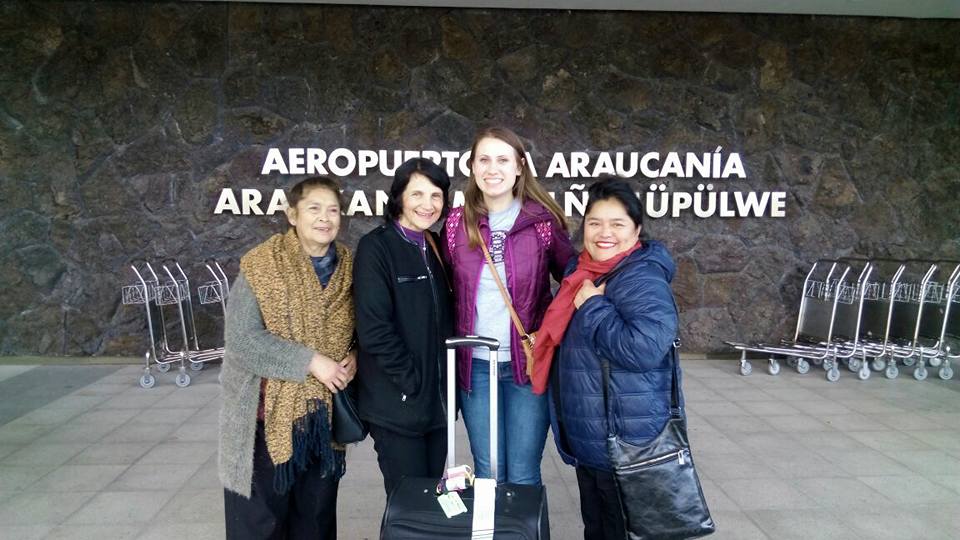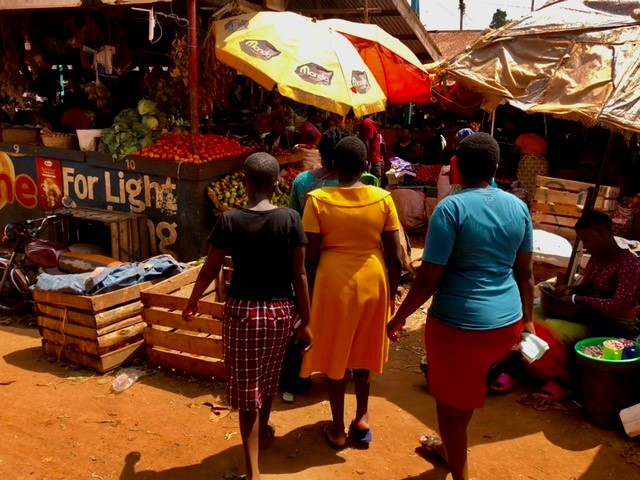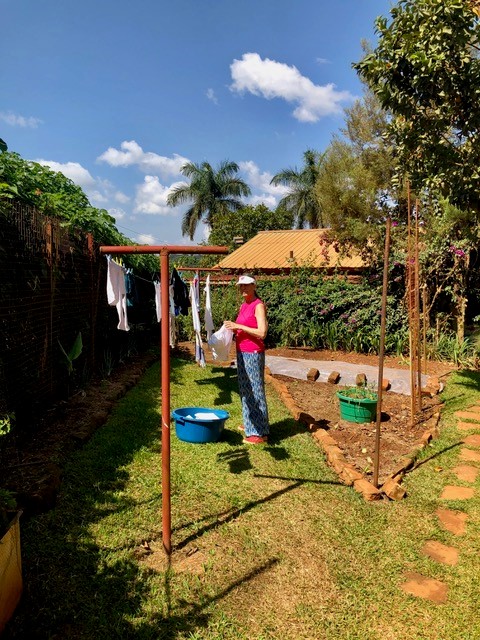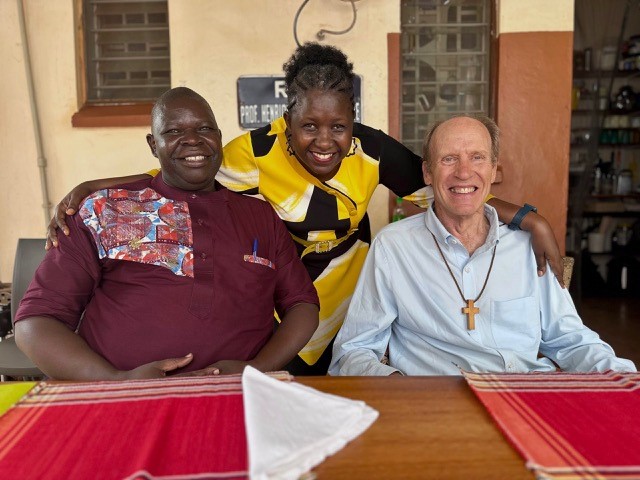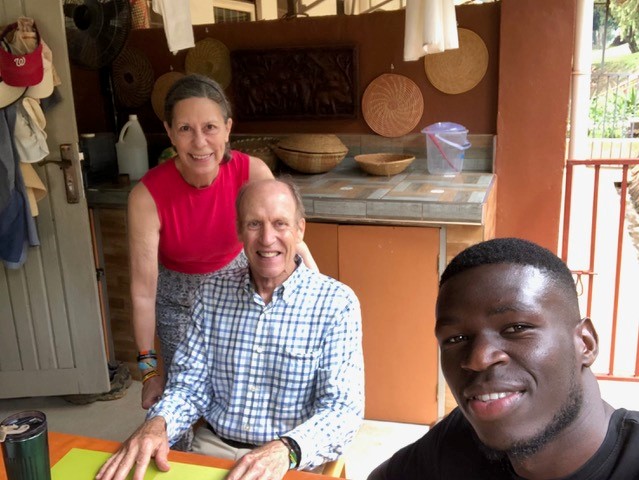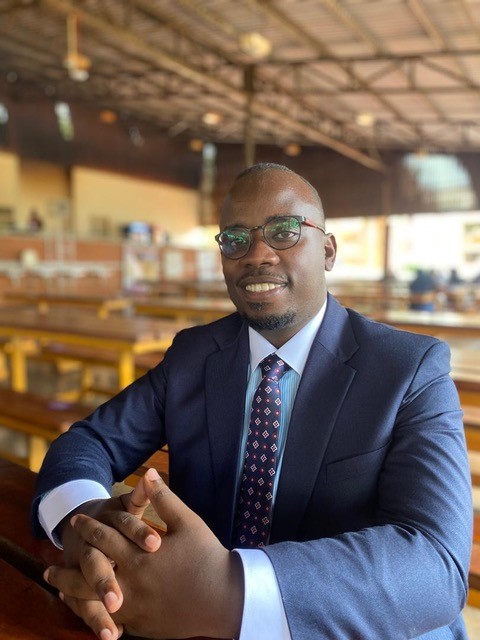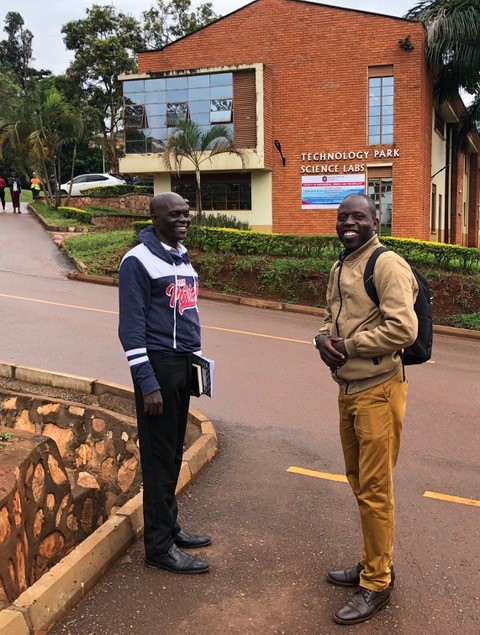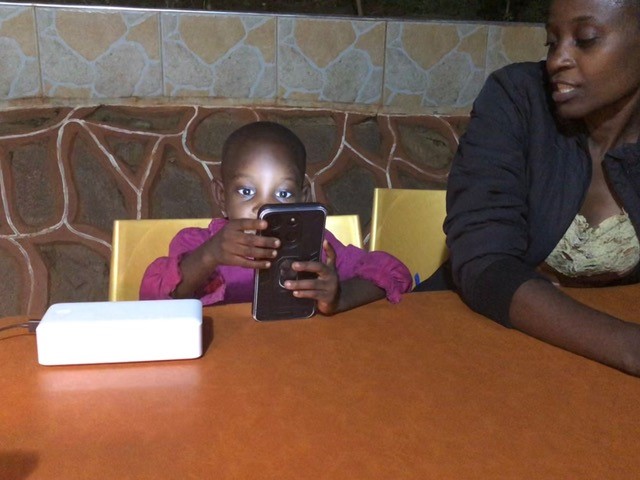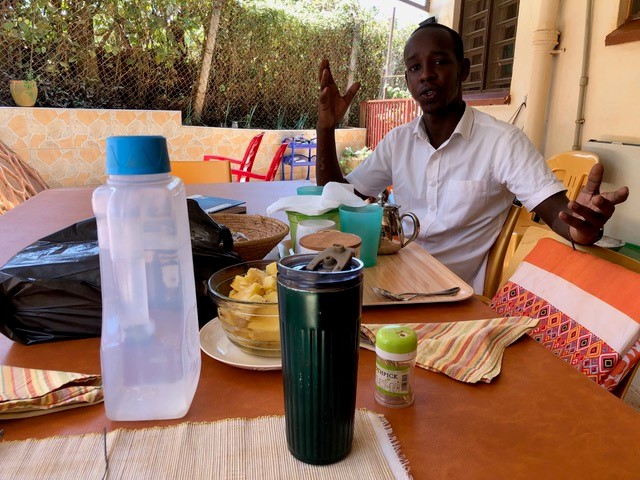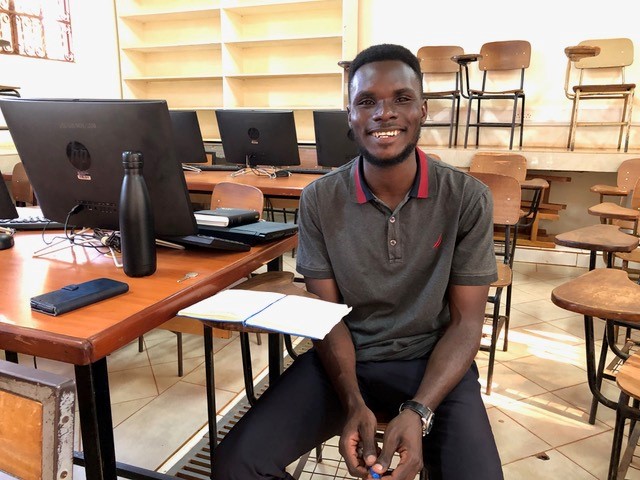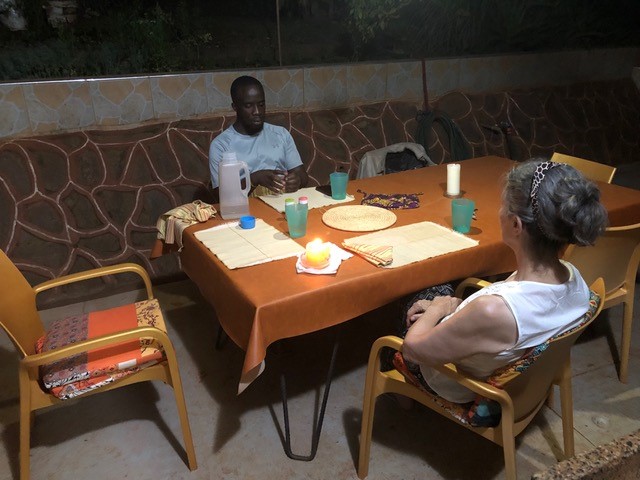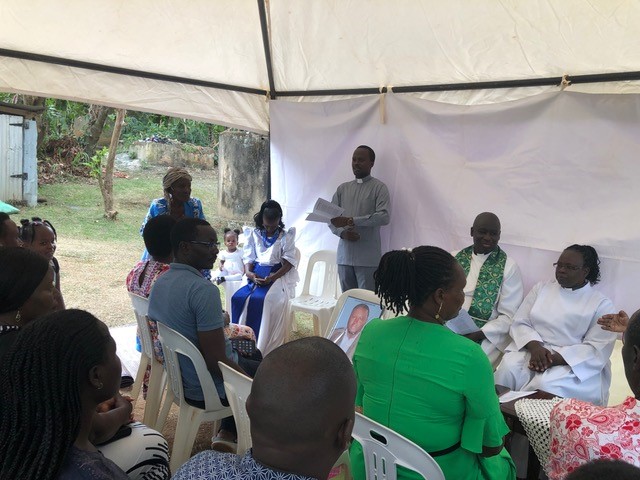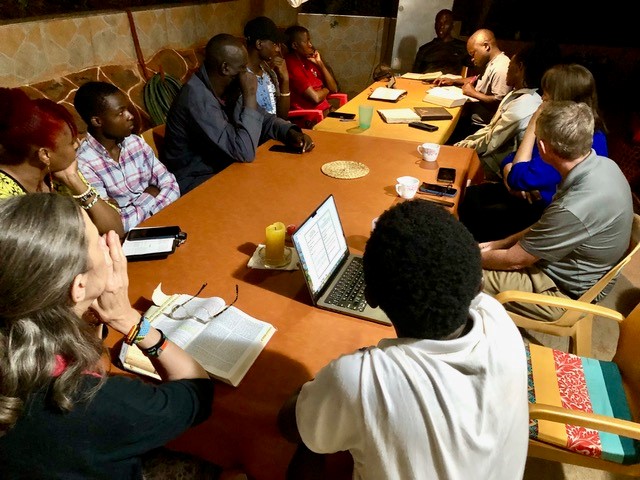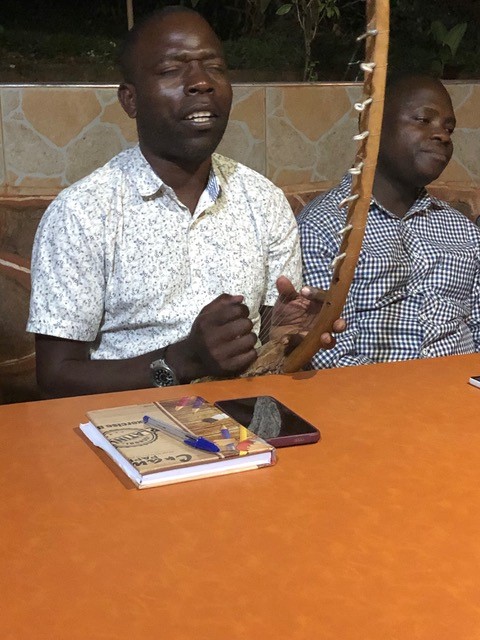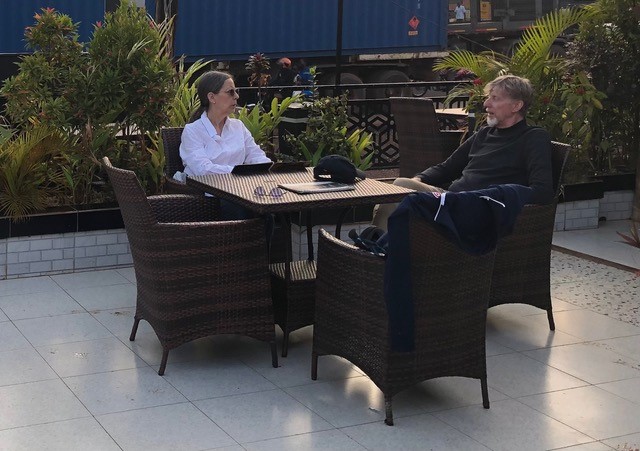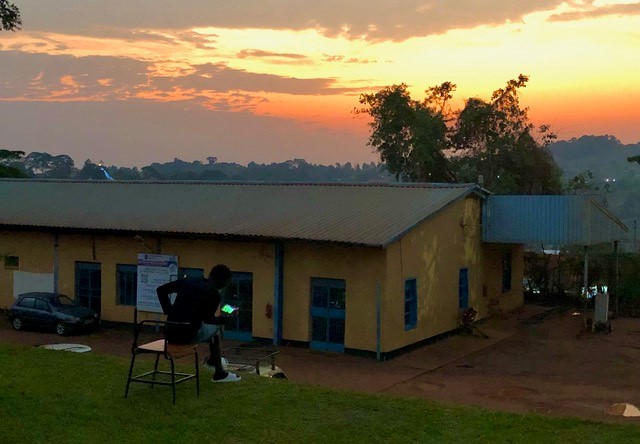
by Russ and Heidi Smith | Feb 5, 2019 | Chile
This photo shows one of the points where fires have been burning during the weekend and now.
This particular one is behind the rural Mapuche community where Bishop Abelino was born and raised. Fortunately, in this case, the fire has gone away from homes.
But as we write, they are evacuating people from where Marita’s family lives and there the fires have reached to their nearest neighbor’s property.
On Saturday night, Pedro spent most of the night helping protect the school where his father works and right now he and Joyanne have gone out to Marita’s family home to offer their help.
In Malalche, houses have been burned, two people have died, and Pastor Antonio is worried.
In Dollinco, they have no electricity, so they have no water, and that makes it difficult for Pastor José’s family, as their daughter, Adriana, is terminally ill with cancer.
In our own church in Labranza, Sonia, one of the members, was worried yesterday that their wheat crop will be burned if they can’t get it harvested.
The sky is gray and smoky today in Temuco and a nearby hill is on fire.Please pray for us and especially our brothers and sisters in the rural churches whose livelihood depends on their crops, animals and wooded land.
Thank you for your prayers. We will keep you posted.
Russ and Heidi

by Juliet Millard | Jun 6, 2017 | Chile
Who am I?
Hi! This is my very first blog post from Chile, where I am serving as a SAMS Bridger for just over 2 months. This is the start of my third week here, and I figured I should probably post something to share about my experience so far! My name is Juliet Millard and I am 21 years old. I’m going to be a senior at Grove City College this fall where I’ll be finishing my final year as a PreK-4 Elementary Education major and Spanish minor.
What am I doing here?
I applied to be a SAMS Bridger almost a year ago and had know idea where I would be placed or what I would be doing. All I knew is that I would prefer somewhere Spanish-speaking. Well, many months later, and here I am in Chile!! I am living with a very sweet host family in Temuco and commuting daily to the town, Chol Chol where I am helping at an Anglican school here. My days consist of time spent helping with the English classes and Religion Classes. I’m also teaching my own English class/workshop for 45 mins after school 3x a week!
What is God doing?
That’s a big question. But, God is doing a lot. There are some incredibly faithful people here that are doing amazing things for God’s kingdom. It´s encouraging to see how intentional many of the people I’ve met here are with their walks with God. I think the greatest way I’ve felt God’s presence so far though, has been through other people. I’m a very people-oriented person! I love spending time with other people and making new friends. However, my transition here in Chile has been pretty difficult for me. I was super nervous to travel down and I’m having a much harder time than I thought I would communicating (Chilean Spanish is quite the challenge!!), which has made it very difficult to make new friends and be a “people person.” But, God has been placing people along my path to help me every step of the way.
On my very first flight from Pittsburgh to Toronto, I ended up sitting next to a girl who was my age, from my city, and getting on the same connecting flight as I was in Toronto to Santiago! We ended up talking the whole flight and navigating our following connection together. I don’t know if I could have done it without her! (Shout out to Haley if you ever happen to see this!)
Then, when I landed in Santiago (where I was crazy nervous about figuring out my connection), out of nowhere this man saw me and helped me every. single. step. of the way through the airport. He helped me check in, go through security, and find my gate! It turns out we were headed to the same flight anyway, which made it easier for him to help me, but I didn’t know him, didn’t ask for his help, but he just saw me and knew I needed it. He wasn’t sketchy, had no malicious intent, and didn’t want anything from me. He simply wanted to help. Just because.
Here in Chile, I am very grateful for the people God has placed in my path too. I have a wonderful host family (who let me come home to them and cry after long confusing days where I feel like I only understand two percent of what people say to me) and mentor family (thank you Smith Family for always driving me everywhere and asking how I’m doing)! But, I’m especially grateful for the English teacher here, whom I’ve connected with. She’s only a few years older than me and so kind and helpful. Without her, this whole experience would be a million times harder. We speak in Spanish but she graciously lets me make a million mistakes, ask a million questions, and never gets mad or frustrated. She has shown me everything I need to know in terms of navigating the school here, and she too, has let me cry when I was overwhelmed with emotion and all that comes with being in a new place! (Thank you Fabiola for being so wonderful!!)
How can you pray?
First and foremost, please be praying for all of the teachers and students that I’m spending most of my time with here. Pray that the Lord will give the teachers all the patience and strength that they need each day, and that the students would have the desire and willingness to listen and learn.
Second, please just be praying for me as I continue to navigate this new experience – especially Chilean Spanish!! I have discovered I´m really not that great at Spanish… ha-ha! It makes everything a little harder when I have a really hard time understanding everything everyone says!
Thank you to everyone for all your support and I promise I’ll post more pictures once I figure out how!!

by Brendan Kimbrough | Mar 20, 2025 | Africa, SAMS Missionaries, Uganda
Even in “ordinary time” African colors are always bright. From the Chico Market in Mukono Town.
by Richard and Catherine Ranger, SAMS Missionaries to Uganda

So be careful how you act; these are difficult days. Don’t be fools; be wise: make the most of every opportunity you have for doing good. Don’t act thoughtlessly, but try to find out and do whatever the Lord wants you to. (Ephesians 5:15-17)
The Roman Catholics have two seasons in their liturgical calendar that they call “Ordinary Time”. The longer of the two they formerly called “Pentecost” (in the 20-odd weeks that follow the Sunday feast of the same name) and the shorter of the two formerly called “Epiphany”, which runs from that feast to Ash Wednesday. From a spiritual standpoint, I’m not sure what is gained or explained through the use of the term “Ordinary Time”. But from the standpoint of a mirror between faith and human experience, the term is apt.
There are seasons throughout our lives that are ordinary time, like the midweeks of school years once October arrives when the new school year and new homeroom are no longer new, and life is dominated by the recurrence of homework and the approach of tests. Any profession or any job involves periods of ordinary time that fall between major project assignments or the odd crisis. So it is with service in mission. The encouragement comes from the fact that if a period in mission experience meets the criteria for ordinary time, then mission life is normal life, and an indicator that one is where he or she belongs. These are some scenes and stories from our “ordinary time” serving here at UCU – including a number of vignettes of students whom we have been fortunate to get to know and whose journeys we are privileged to follow.
Catherine’s role in the administration of the UCU Honours College still does not have a title, but it involves plenty of work. Dickson Tumuramye took over as Director last year, and with Catherine’s assistance, has been hard at work re-establishing it as an experience of intellectual and personal challenge and growth for the students enrolled. The principal expectations for the students are involve the completion of four research papers over four semesters, the preparation of a number of presentations, and participation in weekly workshop discussions held Thursday evenings. There is also a weekly Wednesday early morning prayer fellowship, departmental meetings, and meetings with students, mentoring and otherwise. The Wednesday fellowships allow the option of in-person or Google Meets participation. If Catherine gets up in time to walk up to Thelma Hall to join in person, Trooper goes with her. In recent months Trooper has definitely become much more of a senior dog (he’s over thirteen now), so as quiet as he has become he’s no longer much of a distraction and once at Thelma Hall finds himself a place on the floor to rest next to Catherine.
Thursday evening workshop nights can run late but are almost always very engaging. In addition to student presentations on topics of their choice, there is usually a speaker on a topic relating to faith or professional development. A couple of weeks ago I collaborated with our friend, former Jessup Moot Court participant, and former Honours College student Lastone Gulume (now a managing partner with a Kampala law firm) on a joint talk about situations when job roles or assignments can present a challenge to one’s faith.
Most other Thursdays in the spirit of “ordinary time” when Catherine is at Honours College workshop night, I’m getting the laundry off the line that Dorothy our housekeeper has hung to dry that day – although as the photo below will show, Catherine spends much more time with the laundry than I do!
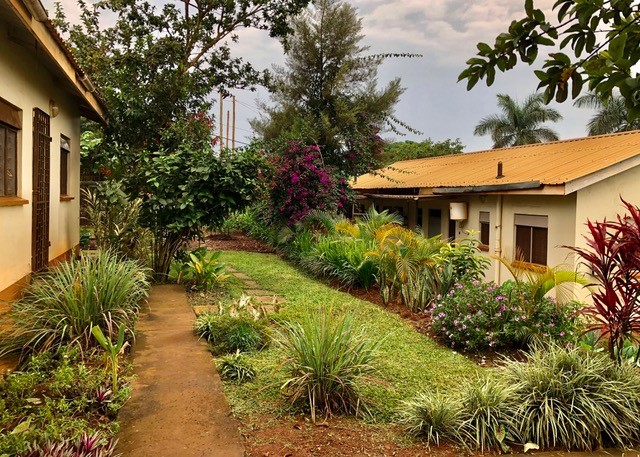
A Saturday morning in Tech Park where we live. For the first time since we’ve been here, all eight Tech Park units are occupied. We even have another missionary household: William and Jennifer Hatzfeld from California who have come here to UCU and to East Africa with the Meros Center. The Meros Center is a research and training community where relationships and resources come together to measure, innovate, and share impact in Christian health ministry.

With all eight Tech Park units occupied, including three with families with pre-school and school-age children, the liveliness of their games and laughter is our neighborhood soundtrack. With the newest family having added four children – Tech Park now has a total of 10 children (eleven when Olivet is home from boarding school – although I expect she might object to being lumped in with the “children”). With all those households and all those children, clothesline space is at a premium in Tech Park!

Because those celebrating birthdays and anniversaries during the prior week are called out every Sunday at worship here at UCU, we discovered that two other friends celebrate their birthdays on February 5 like me: Richard Ekadu (L) who manages the campus dining hall, and Prim Tumuramwe (C), who is married to Catherine’s boss Dickson, the Honours College Director. Naturally we had to have a gathering of the “February 5 Siblings”, and of course there was cake.

With our friend Nickson Tumusiime, who graduated in October with a bachelor’s degree in business administration with a major in accounting. One of the top students in the School of Business, Nickson is looking carefully at graduate study opportunities in the US. Nickson starred on UCU’s men’s volleyball team and also plays on one of Uganda’s national teams – in his fifth year of organized play

Our friend Fred Burondwa, whose story is described in the text of the newsletter, who has just received his letter of acceptance to the Master of Energy Transition Program at Dartmouth

Our friends Runcie and Walter who are months away from graduating from the Bishop Tucker School of Divinity & Theology. Their home is in Nebbi Diocese in far northwest Uganda (west of the Nile and adjacent to Congo), and we will travel to their ordination at the end of June. They will serve as worker priests in rural villages in Nebbi Diocese.

Our neighbor (and Catherine’s goddaughter Nyangoma) is fascinated by something on my iPhone as her mother (and our good friend) Immaculate looks on.

Nicholas Akampurira was one of the better students in my Corporate Governance class a year ago. He graduated in October and I ran into him when he was back on campus for some paperwork he needed. We agreed to meet for tea (and fresh pineapple). Nicholas recently advanced from intern to full-time account manager with UGAFODE Microfinance Limited, an MDI (micro-deposit taking institution) or microfinance lender providing affordable credit services to customers, the majority of whom are women with small farms or businesses. UGAFODE offers savings accounts for people with very small asset bases (some merely in the tens of dollars US), a mix of loan products, and money transfer services. Nicholas travels to his clients’ homes, shops, and farms in rural Uganda, listens to them, and helps to guide them to pursue goals and to develop achievable plans. Some of his clients are refugees from conflict in Sudan, or from the desperate poverty of Burundi. Nicholas is actually a banker at a very small scale, helping to identify and to support small businesspeople to take their next step. Nicholas says “it’s all about relationships.” Remembering him from my classroom I know that Nicholas possesses the heart, the ethics, and the energy that will make a difference for those he serves.

Okot Innocent, who graduated with a bachelor’s in Engineering in October and who now interns with the Department of Environmental Engineering, is the principal steward of the solar water heating project for the UCU campus dining hall. The project took shape in 2022 as a result of student research initiated through the Dartmouth Humanitarian Engineering Program, blossoming as a student-to-student learning effort involving UCU and Dartmouth students over more than two years. Okot is project lead on the design and installation of the project’s third phase, which will involve installation of a photovoltaic system to use solar power to produce electricity to charge a coil to heat stored water. This will allow side-by-side comparison with the present solar thermal equipment that uses the sun’s power to heat water as opposed to producing electricity. We hope to learn which approach is more cost effective, simpler to install, operate, and maintain, to better understand which offers a more useful model here in Uganda as a substitute for the current and widespread reliance on biomass/firewood for institutional-scale cooking.

Our friend Daniel Tumusiime (no relation to Nickson) visited for dinner recently. Having graduated in 2022, Daniel is now the staff engineer for a coffee producer here in Uganda, where he handles matters ranging from water and waste systems, mechanical issues with processing equipment, road maintenance, you name it. At dinner with us, Daniel shared a multitude of insights on how a mid-sized Uganda company finds opportunities and an ever-changing coffee export market – seeking markets as far away as Poland and Russia. Some may remember meeting Daniel and the UCU team lead for season #1 of the UCU-Dartmouth solar water heating project.

Joining our campus community in prayer, mourning, and remembrance, honoring the life of Frederick Muganza (see portrait on chair in the center of the photo), who was father to our friend and former Tech Park neighbor Joy Kamoga. Here in this photo Joy’s husband, Rev Alex Kamoga is offering a tribute to his late father-in-law. Joy is seated immediately to Rev Alex’s right. The gathering of family, friends, and community to share grief with the bereaved here in Uganda is something deeper than mere “custom”. It is the superpower of a culture that bears the spirit of the village in its soul.
Wednesday evenings Catherine and I host our fellowship group on the patio of our Tech Park home. We’ve written before how our former next door neighbor, Mary Chowenhill, showed us the value of increasing the useful space of a Tech Park unit by fifty percent by putting a roof over the patio. Unfold a second table to add to the eight seat table we have on the patio (and where we eat virtually all our meals), gather all available stackable plastic chairs among the households in Tech Park and we can host 16 or more for our fellowship, who include neighbors, students, and friends, and who can come from as many as six different countries – and speak any number of languages. We serve tea, biscuits, groundnuts, and chapattis and hard-boiled eggs for our guests -especially the students – to take home.
The patio is also where we meet students for conversations. Some are regulars. Esther, a fourth year law student considering a possible masters’ program after she graduates in July, is among Catherine’s mentees, and an Honours College scholar. Okot, who graduated with a bachelor’s in Engineering in October, comes by to avail my services as a sounding board as he advances the design of a photovoltaic unit for the solar water heating system for the campus dining hall kitchen from concept to prototype.
Over the past few months I’ve been meeting with Fred, a law student who graduated last July who visited to sound me out on the idea of pursuit of study in the field of energy policy. Our discussions led to Fred asking if I would prepare a letter of recommendation on his behalf. He also asked for my assistance on the two professional statements that were required for his application. Among students with whom I’ve worked here, Fred is an unusually good writer. In the years I’ve known him, he has impressed me with his analytical capabilities as well as his skills as a good storyteller to support his analysis, as I’ve watched him advance toward a mature and discerning perspective on how to apply his gifts, his education, and his aspirations in ways that can make a difference for his society.
Thus it was an occasion for great joy on my part when he texted me last Thursday evening to let me know that he has been admitted to the Master’s in Energy Transition program, a new program jointly administered by the Guarini School of Graduate Studies and the Irving Institute for Energy and Society at Dartmouth College, my alma mater. The College’s graduate studies website says, “Dartmouth’s nine-month, residential MET degree program provides interdisciplinary coursework, hands-on experience, and industry mentorship to equip early-career professionals with the skills and networks needed to help power a more sustainable, climate-stable future.” Fred’s vision is to focus his studies on practical, scalable renewable energy systems for farmers in East Africa. Fred grew up on a farm in a village in the western part of the country. In Hanover, Fred will learn, and he will also contribute and help others to learn. Dartmouth, Fred, and Fred’s fellow students in the program will all be blessed.
So that is a window into “ordinary time” as we experience it here at UCU. Your encouragement, friendship and support are indispensable to sustaining us as we serve here.

Our new neighbors have helped to double the size of our Wednesday evening fellowship of Americans, Ugandans, and friends from Congo, Tanzania, and Kenya. Thankfully we still have enough stackable plastic chairs from among our several households to find seats for those who come.

Our fellowship opens offers lively conversations about scripture, faith, and life with our neighbors – opening the doors of our experience to learning from them as peers, reminding us that we are servants here. And if our friend Walter Jerapha brings his adungu – a Ugandan harp of traditional design, the music can be wondrous.

Catherine in conversation with our friend Thom Froese, a Canadian journalist who visits UCU every year to assist the School of Communication and to mentor students here. For Catherine and me as (still) relative newcomers, Thom and his wife Dr Jean Chamberlain Froese are elders – people whose example is an inspiration and whose friendship is a gift. Thom and Jean came to Uganda from Yemen where the disorder and violence of that country proved a barrier to serving there in the field of medicine and women’s health. Thom tells their story in his book ‘Ninety-Nine Windows: Reflections of a Reporter From Arabia to Africa and other Roads Less Travelled’ , which may be found through his website https://thomasfroese.com/.

At dusk in Tech Park, a student checks his smart phone. Serving here at UCU reminds us every day that we live in an interconnected world. The very act of preparing this newsletter puts me on the internet to access MailChimp, the commercial email marketing platform SAMS makes available to its missionaries serving from Chile to the Solomon Islands. In the weeks since our last newsletter, with the gutting of the agency US Aid for International Development (USAID), the current administration of our country has set in motion effects that risk profound harm across that interconnected world. We won’t take up your time here presenting the policy arguments as to why this action is as destructive as it is at so many levels in the majority world (it is so, and information on the subject is abundant). Instead, we want to share the story that ordinary life here in Uganda has enabled us to meet people in whose footsteps we follow, like William and Jennifer and Thom and Jean, and to students to whom we have introduced you in this newsletter, like Okot and Fred and Nicholas, and in previous newsletters like Miriam and Racheal and Daniel, or our friend Rev Bisoke Balikenga in Bunia, DR Congo, whose Peace Center community daily welcomes refugees fleeing the war in Congo between the country’s fragile government and the forces of warlords armed and backed by neighboring Rwanda. Our friends serve on the front lines between peace and conflict, between health and disease, between ethics and corruption. In the metaphor of the struggle against evil in a darkening world explored by Madeleine L’Engle’s magisterial novel from 1962, ‘A Wrinkle in Time’, the friends we have encountered here are meeting the challenges of darkness with hope, with grit, and with servant’s hearts. And with love. As Ms L’Engle writes: “To love is to be vulnerable; and it is only in vulnerability and risk—not safety and security—that we overcome darkness.” In a time when an American Administration can destroy a program to combat AIDS in Africa that has saved millions (to name just one of the USAID programs), we, and most everyone we know, are each doing what in comparison may be considered small things. But if it is the will of the regime directing our government for us to cease to do big things, then we shall change the world by doing small things. Because, as author Madeleine L’Engle quotes from Paul’s first letter to the Corinthians: “God chose the foolish things of the world to shame the wise; God chose the weak things of the world to shame the strong.” And as the student in the photo with the smart phone shows, it’s an interconnected world. The same world. Our world. Along with our friends here, we do what we can to respond to assist that world – in ordinary time.
To learn more about Richard and Catherine Ranger and to learn about how you can support their work in Uganda go here.

by Brendan Kimbrough | Apr 7, 2024 | SAMS Missionaries
by Heidi Smith, SAMS Missionary to Chile
Twenty-nine years ago, I met a young woman named Carla at the beginning of the new school term. Carla happened to be our son Joshua’s new kindergarten teacher. We were living in Villa Alemana, Chile, where my husband Russ was serving as pastor of San Esteban, the Anglican parish there. I would often see Carla at school and it wasn’t long before I discovered that she was a ‘disillusioned Mormon.’
As Carla related some of her story to me it was clear she was struggling. She had left the Mormonism of her childhood because of the inconsistencies she had witnessed – people saying one thing but doing another. She clung to the idea that if you could be perfect, or at least look perfect, you would be ok. Appearances were everything to her.

Carla with Kindergarten Class in Villa Alemana
One day I invited her to our ladies’ group and she seemed to really enjoy it, especially when we talked about God, about answer to prayer, and about the difference Jesus could make in your life. Later on, Carla had told me that our ladies’ group had reminded her of her Pentecostal grandmother whose robust faith she had seen firsthand when living with her during college. Her grandmother had impressed upon her how real her faith was to her. Her grandmother had never stopped praying that one day God would bring Carla out of Mormonism and bring her to Christ.
Soon afterward Carla asked to meet with me to talk one-on-one. When we met, I had the chance to share the Gospel with her. “But,” Carla objected, “God can’t accept me because I am not perfect.” “None of us is,” I told her, and she insisted that I was. I explained to her that that was definitely not the case!
I told her, “The only perfect one is Jesus, and He died to take the punishment we deserve for our sins. His death makes it possible for us to be forgiven and to come into a relationship with God through Him…. would you like to receive Jesus into your life?” She said, “Yes, I would.” As she began to pray, she acknowledged her sin and asked Jesus to come into her life. She told Him that she renounced anything she had been taught in the Mormon church that did not agree with God’s truth. That was the beginning for Carla.
She started coming to church and doing Bible study and growing in her faith. The church family received her with open arms as a single mom. A few years later, God blessed Carla with a husband, a Christian musician named Pablo who loved her and her little son, married her, and received 3-year old Andres as his son. Soon after, little Daniela came along.
A few years later, we moved from Villa Alemana to a city 500 miles to the south. Carla, Pablo, and their kids moved 1000 miles to the north when Pablo found work in the mining industry. Carla was able to find an even better teaching position there. Now we were separated by 1500 miles, and other than seeing each other’s news on Facebook, we didn’t have much contact for more than a decade.
Ironically, it was the COVID pandemic that brought us together again. Chile was very locked down. Gatherings of any kind were prohibited including church services for over a year and a half. Zoom meetings became the way to connect, and we reached out to people we had known over the years who we thought might be interested in joining us for an online prayer, worship and, study.
Carla joined the nightly women’s prayer meetings and once again we were involved in each other’s lives. It was an amazing time, but not without difficulties. Carla went through what she later described as “a huge storm in my life.” She told me that she would not have made it had it not been for the support of our nightly prayer group. By God’s grace she did persevere, and a new chapter in her life had begun.
As the pandemic ended the Prayer Group began meeting weekly. The relationships forged during those months were too strong to just let go. Last October, at one of our weekly prayer times, I announced to the group that Russ and I would be traveling to the U.S. for our bi-annual time of visiting supporting churches.
Out of the blue, Carla piped up, “I want to go with you.” “Right,” I replied jokingly, “Just hop in my suitcase and you can come.” But Carla wasn’t joking. She not only wanted to come, she believed that God wanted her to come. As the days went by, I realized she was serious. I spoke to Russ about it because in all of our 37 years in Chile, we had never had someone from Chile join us on our home assignment. To my amazement, Russ thought it was an interesting idea.
I told Carla that our home assignment was not a vacation and there wouldn’t be much time for tourism. She had never even left Chile, much less visited the U.S. I asked her why she wanted to come. She said, “I want to go with you to visit the churches that support you. I want to see what you do.” I asked if she would be willing to share her story to which she responded with an enthusiastic “YES!”

Heidi and Carla at O’Hare Airport
Everything came together, as it does when God is in it, and on a record-breaking frigid night of -22 degrees in Chicago, Carla arrived at O’Hare airport. Twelve hours later, she was by our side, sharing her story in the church we were visiting that morning. She got choked up as she read it. (She had it written down to be sure she got the English right.) I put my arm around her and got teary too. And then I noticed that people in the congregation were tearing up. Afterwards, people came up to her and told her how her story had touched them.
Besides talking about how she had met us 29 years ago, Carla included the following in the story she shared with 10 groups of people over the next 17 days she was with us:
Russ and Heidi gave me a beautiful testimony of Jesus. They taught me about a loving God. I didn’t have to be perfect for God. And that was amazing for me!! I learned that God loved me just as I am and that Jesus had died for me. They invited me to meet this God of love and hope. They shared their light and joy with me.
And so, one day when I met with Heidi, I asked Jesus to come into my life. I came to understand that God has a purpose for my life, and I told myself with great conviction in my heart: Surrender! Stop fighting! Surrender to Jesus! And so, I did. On that day I took the step, the step of faith. I started to live just one day at a time. I felt His hope renew me daily. Recently I have had to go through a great storm in my life and definitely… I am not the same. I started having a plan, a little plan, making every day count. Having a daily purpose, just a small purpose, and little by little I have begun to advance because I’m not alone. Finally, I understand I can’t go back and change the beginning, but I can start from where I am and change the ending because God is with me. Over the years, I have shared my faith with others. I too have invited people to meet Jesus.
I thank God that one day Russ and Heidi decided to begin this walk as missionaries, and that that decision was a life-long one, because their testimony changed my life forever. I love them with all my heart.

Carla with Heidi and Russ sharing her testimony to the congregation
It seems there were words of truth and encouragement in her story for many people to hear. God brought her with us as the “good fruit” of our ministry in Chile all of these years, as well as to be an ambassador for Him. It’s a testimony of how He can bring light out of darkness. And about when we go through “a great storm,” God does not abandon us. Our Way Maker is making a way for us to encounter Him and others. “Even when we can’t see it, He’s working. Even when we can’t feel it, He’s working,” and as the words of that song say. “He never stops, never stops working.”



